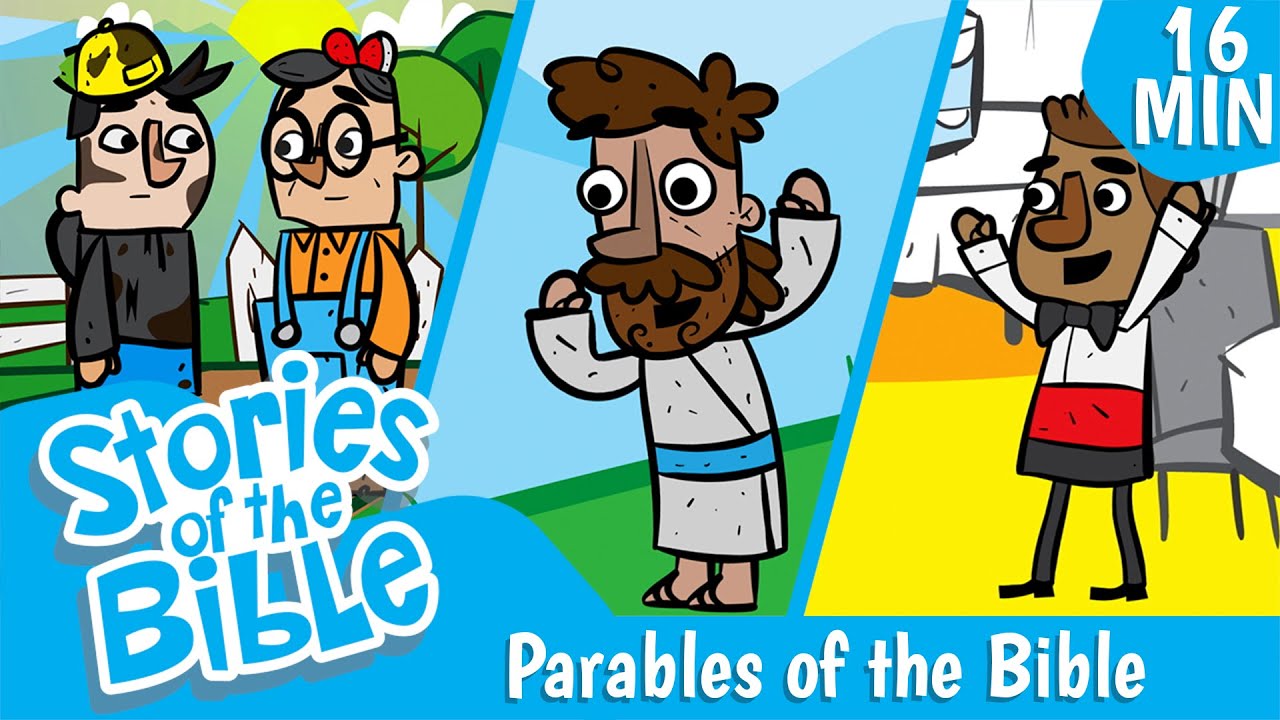“The Prodigal Son: A Story of Forgiveness and Love” is a video by Saddleback Kids that features five Bible stories about parables. Aimed at children and young audiences, this video enables viewers to engage with and learn from biblical teachings through storytelling. The content includes the well-known story of the Prodigal Son as well as four other parables from the Bible: the Parable of the Farmer, the Parable of the Good Samaritan, the Parable of the Great Banquet, and the Parable of the Lost Sheep. Each story is accompanied by music and narration, presenting Jesus as the Son of God and the Savior of the world, teaching about God’s love and performing miracles while on Earth. The video also explores the reactions of the Pharisees and Jewish leaders to Jesus associating with tax collectors and those who have made bad choices, emphasizing the themes of forgiveness and love conveyed by the Parable of the Prodigal Son.
In “The Prodigal Son + More Parables of the Bible” by Saddleback Kids, viewers will find a collection of stories from the Bible, narrated and presented in an engaging manner. The video showcases the stories of the Prodigal Son, the Farmer, the Good Samaritan, the Great Banquet, and the Lost Sheep, all accompanied by music and narrated by Jesus, who is depicted as the Son of God and the savior of the world. Through these parables, viewers learn about forgiveness, love, and the value of kindness, while witnessing the joy in heaven when a lost sinner returns to God. With its focus on teaching biblical lessons to children and young audiences, this video provides an accessible and captivating way to learn about and connect with the teachings of the Bible.

The Prodigal Son: A Story of Forgiveness and Love
Overview of the Prodigal Son story
The Prodigal Son is a well-known parable from the Bible that teaches about forgiveness and love. It is a story of a young man who rebels against his father, squanders his inheritance, and eventually returns home seeking forgiveness. The story highlights the unconditional love and forgiveness of the father, the jealousy of the older brother, and the valuable lessons we can learn from this narrative.
The Prodigal Son’s Rebellion
In the Prodigal Son story, the younger son requests his share of the inheritance from his father. This request is seen as an act of rebellion, as it goes against the cultural norms and expectations of the time. Despite his father’s warning, the son sets off to a distant land, wasting his inheritance on wild living. This rebellion leads him to a place of emptiness and desperation.
The Father’s Unconditional Love
When the prodigal son finds himself in dire circumstances, he realizes the depth of his mistakes and decides to return to his father’s house. To his surprise and relief, his father welcomes him with open arms, showing unconditional love and forgiveness. The father’s reaction exemplifies the love and compassion that God has for all his children, no matter how far they may have strayed.
The Older Brother’s Jealousy
In contrast to the father’s welcoming and forgiving nature, the older brother responds to the prodigal son’s return with jealousy and resentment. He questions why his father would celebrate the return of his wayward brother, seeing it as a disregard for his own loyalty and hard work. This jealousy serves as a cautionary tale, reminding us of the dangers of resentment and the need to cultivate an attitude of love and acceptance.
Lessons from the Prodigal Son story
The Prodigal Son story teaches us several important lessons. Firstly, it demonstrates the power of forgiveness. No matter how far we may have strayed or how big our mistakes, God is always ready to forgive us when we repent and turn back to Him. Secondly, it emphasizes the importance of unconditional love and acceptance. Just as the father in the story welcomes his son back wholeheartedly, we are called to love and accept others without judgment or conditions. Additionally, the story reminds us of the significance of repentance and the need to acknowledge our mistakes and seek forgiveness. Finally, it warns against the destructive emotions of jealousy and resentment, urging us to embrace love and understanding instead.
Other Parables in the Bible
In addition to the Prodigal Son, there are several other parables in the Bible that carry valuable messages and teachings.
Parable of the Farmer: Receiving and Responding to God’s Word
The Parable of the Farmer, also known as the Parable of the Sower, teaches us about the different ways people receive and respond to God’s Word. Just as seeds fall on different types of soil, God’s Word can find a place in receptive hearts or be hindered by various distractions. This parable encourages us to cultivate fertile hearts, ready to receive and act upon God’s teachings.
Parable of the Good Samaritan: Loving Your Neighbor
The Parable of the Good Samaritan emphasizes the importance of loving our neighbors as ourselves. The story narrates how a Samaritan, traditionally seen as an enemy of the Jews, showed compassion and mercy towards a man in need. Through this parable, Jesus challenges us to broaden our understanding of who our neighbor is and to extend love and care to everyone, regardless of their background or circumstances.
Parable of the Great Banquet: Inviting the Marginalized
The Parable of the Great Banquet tells the story of a man hosting a feast but being repeatedly rejected by those he invites. In response, he invites the poor and those who are marginalized in society, emphasizing the importance of inclusivity and reaching out to those who are often overlooked. This parable encourages us to invite and welcome others, especially those who may be considered outcasts or less fortunate.
Parable of the Lost Sheep: The Joy of Repentance
The Parable of the Lost Sheep describes a shepherd who leaves his flock to search for one lost sheep. When he finds it, he rejoices and celebrates its return. This parable highlights the immense joy in heaven when a sinner repents and returns to God. It serves as a reminder of God’s relentless pursuit of us and the importance of repentance in our spiritual journey.

Jesus as the Son of God and the Savior
Throughout the Bible, Jesus is depicted as the Son of God and the Savior of the world. He teaches about God’s love, performs miracles, and offers healing to those in need.
Jesus’ Role as the Son of God
As the Son of God, Jesus holds a divine and unique relationship with God the Father. He is described as the second person of the Holy Trinity and is believed to have come to Earth to fulfill God’s plan of salvation and redemption for humanity. Jesus’ role as the Son of God demonstrates God’s deep love for His creation and His desire to reconcile humanity to Himself.
Jesus’ Teachings on God’s Love
Jesus’ teachings on God’s love highlight the central message of the Gospel. He emphasizes the commandments to love God and love one another, encapsulating the essence of God’s character. Through His parables and teachings, Jesus sheds light on the unconditional and sacrificial love that God has for His children.
Jesus’ Miracles and Healing
Jesus’ miracles and healing acts illustrate His divine power and compassion. He performed miracles such as calming storms, feeding thousands with a few loaves of bread and fish, and healing the sick. These miracles demonstrate Jesus’ authority over nature and illness, offering hope and revealing God’s desire to restore and heal our brokenness.

Reaction of the Pharisees and Jewish Leaders
The Pharisees and Jewish leaders during Jesus’ time reacted with disapproval and skepticism towards Jesus’ associations and teachings.
Disapproval of Jesus’ Associations
The Pharisees and Jewish leaders disapproved of Jesus associating with tax collectors and sinners, considering it a violation of religious norms and social hierarchies. They believed that engaging with those who had made bad choices would compromise one’s righteousness and tarnish their reputation. This disapproval led them to question Jesus’ actions and authority.
Conflict with Tax Collectors and Sinners
Jesus’ willingness to interact with tax collectors and sinners caused tension with the Pharisees and Jewish leaders. Tax collectors were seen as collaborators with the Roman Empire and were despised by the Jewish community. By showing love and acceptance towards these individuals, Jesus challenged the prevailing religious and societal norms, ultimately leading to further conflict.

Overview of the Prodigal Son Story
The Prodigal Son story begins with a young man who asks his father for his share of the inheritance. He then sets off to a distant land, where he squanders his wealth on wild living. As a famine strikes the land, the prodigal son finds himself destitute and in desperate need. Realizing the depth of his mistakes, he decides to return to his father, humbly asking for forgiveness. When the father sees his wayward son returning, he welcomes him with open arms and celebrates his homecoming. In contrast, the older brother, who has remained loyal to their father, becomes jealous and resentful. The story ends with the father pleading with the older brother to show love and understanding.
Summary of the Prodigal Son Narrative
The Prodigal Son story tells of a young man who rebels against his father and squanders his inheritance before returning home seeking forgiveness. While the prodigal son initially experiences a life of indulgence, he eventually finds himself in a state of desperation and longing. This leads him to repent and seek the forgiveness of his father. The story concludes with the father’s overwhelming joy and the older brother’s resentment.
Key Characters and Their Roles in the Story
The key characters in the Prodigal Son story are the father, the prodigal son, and the older brother. The father represents God’s unconditional love and forgiveness. He demonstrates immense joy and compassion upon the return of his wayward son, showcasing the loving nature of God. The prodigal son symbolizes humanity’s propensity to make mistakes and wander away from God’s love but also the possibility of redemption and forgiveness. The older brother represents jealousy and resentment, highlighting the dangers of harboring negative emotions and the need for love and understanding.








